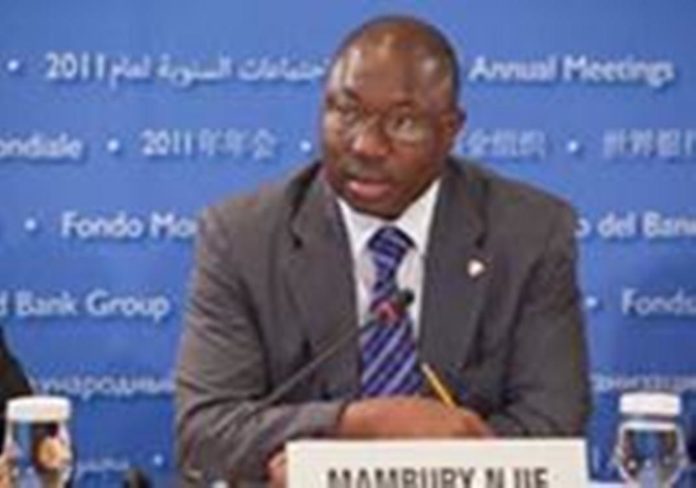By: Kebba AF Touray
The National Assembly on Tuesday, 31st July 2018 passed the Central Bank (Amendment) Bill 2018.
Minister of Finance, Mambury Njie, who presented the Bill before the National Assembly for amendment Njie said the Central Bank is governed by the Constitution and the Central Bank Act 2005, and a review of the law, shows the need to improve the Bank’s Act by drafting amendments and aligning it with best practices.
“Currently, several provisions of the Constitution makes it necessary for changes and amendments to the Central Bank Act. For example in Section 161 subsection 4, the objects of the Central Bank does not include domestic price stability. In Section 162, subsection 3, the term of office for non- executive Directors of the Board is short. Thus the need to address the discrepancies between the Constitutional provision relating to the Central Bank’s Act and International best practices which is guaranteed, be it institutional, operational, and financial and the personal autonomy of the Central Bank,” he said.
Njie added that since the Constitutional review process may take a long time, the Bank sought the indulgence of the relevant Government authorities, to amend the related provisions of the Central Bank Act that was not in conformity with the Constitution as a matter of urgency.
‘‘The Bill was prepared in collaboration with the country’s development partners, particularly the World Bank and the IMF, to amend the Laws with a view to removing these obstacles,” he said; that the main areas of concentration are the objects and functions of the Bank, adding that the objects are not clearly stated as prioritized in both Section 5, subsection 1A, of the Bank’s Act, which stipulates the objects of the Bank in achieving and maintaining price stability.
“The Central Bank has not provided a clear division of labour among the decision making bodies and the scope of responsibility of the Audit Committee is not clearly defined to capture the current prevailing oversight issues of the Bank,” Njie said.
He averred that the Bill proposes to members of the Audit Committee, to solely consist of non-executive members of the board, but clearly states the responsibilities of the committee; that currently, the Central Bank has no provision, which enables the Bank to appoint External Auditors, in line with international standards; that this needs to be amended to enable the Bank appoint External Auditors, upon the recommendations of the Audit Committee.
He explained that several instances of non-compliance occurred in the past, among them the extension of credit to the Government beyond its statutory limit and the provision of finance to the state owned enterprises without statutory authorization, with profits not allocated to the General Reserved Account.
“In order to enhance the Bank’s compliance mechanisms, it is proposed to establish the position of a legal compliance officer, who reports to the Audit Committee at least on a quarterly basis,” he said.
He stressed that he Bill needs provisions to address the problems of the bank in the areas of Institutional and Financial autonomy which he decried, are detrimental to Bank’s autonomy; that the Bills seeks to address this anomaly.
“The Bill if enacted, will go a long way in aligning the Central Bank Act with the International best practices and would enable the Bank to better carry out its mandate in a more effective and efficient manner,” he concludes.
Members of the National Assembly have thumbed up the move by the Minister of Finance Mamburey Njie, to amend the Central Bank Act 2005. Members call for the need to avert the reoccurrence of the dilution of state resources during their emergency sitting.
Sulayman Saho, the Member for Central Badibu expressed that the dilution of state resources during the former regime, is unacceptable and must not be allowed to reoccur; that the 2018 Central Bank Bill is timely and will help ensure that state resources are properly managed in the interest of the country. He urged his fellow parliamentarians to be watchdogs and ensure that the Bill is implemented upon amendment.
Alagie Drammeh, the Member for Jeshwang, hailed the Finance Minister for the move to amend the Central Bank’s Act 2005, but expressed that Clause 4 of the Act needs to be amended; that this can stifle their efforts to ensure access to information from the Bank, and called for the said Clause to be deleted, to enhance access to needed information.
Alagie S Darboe, the Member for Brikama North expressed concern on Section 18 subsection 2 of the 2005 Act which he disclosed, has some changes in Clauses A, by giving powers to the President to appoint the Bank Governor, in consultation with the Public Service Commission and Clause B, for the First and Second Deputies to be appointed on the recommendation of the Minister, instead of the Public Service Commission. He called for the two Clauses to joined as one and be amended for the President to appoint both Governor and Deputy Governors, in consultation with the Public Service Commission.
The Member for Lower Badibu Alagie Jawara, said part of their work is to check and ensure that institutions execute their responsibilities as expected; that the books of account of the Bank, be audited by an independent External Auditor who is appointed and approved by the Board, from a list of external auditors, in the recognition of the Audit Committee as indicated in the Act, to be amended to avert a reoccurrence of the past; that history has taught the country a lot about the Central Bank. He called for the amendment of point number 14, part 5 of the 2018 Bill, which gives powers to the Board, to dismiss External Auditors in good course; that with such, the External Auditor has no job protection and immunity, which will result into ineffective execution of the work of the External Auditor.
Halifa Sallah also contributed to the debate, his contribution will be published in tomorrow’s edition.



















